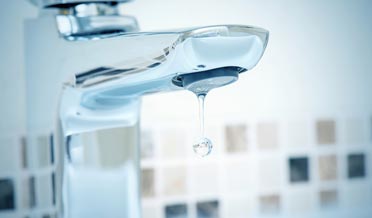Leaking Faucet: The Most Common Plumbing Repair for Homeowners
After a faucet is turned to the off position, the water should stop dripping after a few seconds. If water continues to drip, it usually is considered a leak. Leaks can be annoying, but the constant drip of water is also a costly waste. To repair leaks, it helps to understand the causes of leaks.
Faucet Leaks Under the Sink. Some leaks in vanities and cabinets are drainage leaks; the water from drainage leaks will smell terrible and may be discolored. When a faucet leak is discovered inside the vanity or cabinet, the problem is often poor quality of material or poor installation. First, inspect and tighten supply line joints to make sure the faucet is securely connected. If the joints are secure, investigate whether water is leaking from the material of the faucet. If the tubing or material is leaking, the faucet will need to be replaced.
Movement. Homes with relatively high water pressure can experience water hammering. Turning the water off causes water to slam against the valve and the supply pipe moves as a result. Water hammering often causes a noise heard in the walls or under the vanity/cabinet. It is the movement, not the noise, that can damage the faucet and cause it to leak. A damaged faucet will need to be replaced, but unless the water hammering problem is solved, a replacement will be only a temporary fix.
Leaks From Wear. Residential faucets are turned on and off dozens of times daily and this creates wear on interior parts, especially since many interior parts of faucets contain plastic and rubber parts. These vulnerable parts rub against each other or metal components every time the faucet opens and closes.
Over time, breaks and gaps happen in rubber O-rings and plastic washers, allowing water to pass the closed valve. The main component of many faucets is a plastic cartridge with very few metal components and these cartridges are certainly susceptible to wear.
Replacing O-rings, washers, and cartridges can be replaced by bold do-it-yourself-minded homeowners, but the consequences of getting Plumbing Repairs wrong are rather daunting.
Mineral Deposits and Corrosion. Ideally, all water is pure. In reality, water quality in the US is exceptional, but most water contains minute quantities of local minerals. While water is moving, this is not a problem. However, when stops, the mineral can be deposited in the pipe and inside the faucet valve. Standing water inside water heaters and pipes allows minerals to collect; when the water begins moving, the mineral deposits are slightly more concentrated. When minerals collect inside the openings of the valve, it acts as an abrasive, wearing vulnerable rubber and plastic parts quickly.
When replacing O-rings, washers, and cartridges, it is important to clean deposits away as part of the repair.
Leaking Faucet? We can help with Plumbing Repair!
Let Doctor Cool help with your Plumbing Repair questions before buying your home. Call Doctor Cool & Professor Heat today at 281-338-8751 or email Doctor Cool and let our professional Residential Plumber Contractors assist with all of your Plumbing Repair questions.
